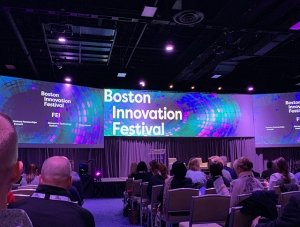On the Front End of Innovation – Reflections on the Boston Innovation Festival

Since March, I knew that our Innovation Team would be attending the Boston Innovation Festival as part of the Front End of Innovation series of events. As the event got closer and closer, I saw “travel coordination” on my list of to-dos, but with competing priorities it was not until about a week before the conference that I looked at my travel plans.
Coming from a location about 60 minutes away from the Boston Seaport—the site of this year’s Boston Innovation Fest—I took to several outlets to coordinate my travel: bus companies, the Waze application “travel planning” function, the Hotel Tonight application, Expedia, Egencia, Google for parking locations & Seaport hotel accommodations, the conference website, and more. For about 60 minutes on a Monday evening, I explored my travel options, looking at things like 5:00 am buses and sold out hotel options, and I finally landed on driving myself down each day to save costs and drive the best efficiency.
While I sat in traffic on that Tuesday morning, I reflected on the biggest trend and greatest innovation in the fleet industry today—mobility. But, more on that later.
For now, I’d like to reflect on some of the learnings, takeaways, observations, experiences, and ah-ha moments of the Boston Innovation Festival, many of which could be usable opportunities for our teams, our clients, and our community.
On the Front End of Innovation
When Innovation Advocacy is a Company-Wide Initiative
The Boston Innovation Festival agenda was overwhelmed with some incredible speakers from companies we all know and recognize—P&G, Caterpillar, General Motors, Gatorade, Apple, and more. We heard from other Innovation Departments about their experiences launching innovation initiatives within their organizations—generally very large organizations. As I heard from these impressive speakers, I intuited that many of these speakers had to learn to advocate for their innovation processes. Many of these initiatives started from “the ground up” and had to be “proven” in order to be supported. The experiences of the folks I listened to were all positive but also full of references to having to advocate for their value.
It was a good reminder that we are lucky to have the Merchants Fleet experience. At our company, innovation is a core value we have held for many years. Innovation was also announced earlier this year as a strategic initiative on the forefront of our company at this year’s Employee Summit. Having team members across the entire organization embrace an innovation culture accelerates our work and supports our commitment to innovate and provide the greatest opportunities to our clients, many of which have already been launch as part of our Fleet Innovation.
The Business Arena is Willing to Invest Earlier Than Ever
Here’s a stat I heard at the Boston Innovation Festival that nearly knocked me off my very comfortable chair—“over 80% of companies going to IPO right now are not making money.” What a compelling business world we live in these days. Seemingly, investors are willing to look at the business model and the potential of a company even earlier in its development process than ever.
This leads to a very important point for those who are investing in innovation initiatives right now. Sometimes we have to release the mindset of “Do we have money for this?” and think more about the VALUE of the initiative. That’s not to say we don’t reflect on budgets—not at all. But, instead, lead with the value and the problem to be solved without putting early constraints on it. Then, once an idea has had a chance to marinate, start small with pilots to test out new ideas that will generate value.
Shifting from the “Failure” Conversation to “Success” Mindset
When I listen to innovation talks and watch videos, a big conversation out there is about “failure” and how it can be a good thing. There was a lot of discussion about failure and its importance in innovation. However, I do believe that words are powerful and word choice is extremely important. When I saw a very compelling diagram about how failure is really about learning and choosing to tack right or left when something is proving to not be valuable, I realized that in the right instances, failure is truly success.
Often when we invest a lot of time in something, we feel like we need to see it through to the end. There are many organizations that will force an idea through and invest in it even when warning signs show that it may not actually be viable. To recognize this lack of viability early, to measure, and to recognize that perhaps a project should not move forward is actually a huge, resounding success. Failure would be spending excess time and resources on something that we knew six months ago was not viable. So, as I thought about “failure” in innovation, it shifted me to start thinking about it in terms of true success.
Innovation Does Not Always Mean Technology
At the Boston Innovation Festival, as I mentioned previously, there were some truly tremendous speakers. So, I approach this particular topic carefully because I do not mean for it to be a complaint. But as I went from keynote to breakout session to networking event, it was interesting to me that on at least 5 separate occasions, the technology needed for the presentation did not work! Videos played without sound and applications were slow to load. Everyone in the audience empathized with the speaker—we have all been there! I truly saw it as an ironic and somewhat humorous reminder to all of us: innovation does not always mean technology.
In my personal experience, in trainings on innovation as well as conversations, when “innovation” comes up many people go right to technology – the iPhone, applications, portable devices, smart technology, etc. But some of the most compelling ideas I have witnessed in innovation had nothing to do with technology. Could we do a process a few days faster? Could we remove paper from an experience? Could we service our client even more proactively? These experiences sometimes had nothing to do with technology and everything to do with looking at where we were are and innovating with what we had.
The Next Steps for Innovation in Fleet
So back to that whole innovation in fleet thing: mobility. Merchants Fleet is on the forefront of an extremely compelling model of delivering the highest value to our clients – the FleetTech model. Through our own growth and feedback about the kind of experience that our clients want, we have recognized the need for an approach where we act as a true FleetTech partner—one that connects the many needs of fleet management clients to the full mobility ecosystem, where needs like my travel coordination will be met [thank goodness!]. We are excited about what’s happening at Merchants, so much so that our CEO will be sharing the Mobility Ecosystem with the audience at TechCrunch Sessions: Mobility 2019 this year.
In summary, being on the Front End of Innovation is a compelling place to be, and there’s no better place to do it than at Merchants Fleet.




